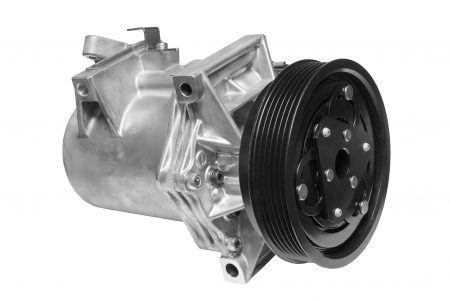 Replacing your car AC compressor is a job you may consider tackling yourself, but you may end up needing a little help from your local mechanic if you want to do be the job the right way. Also, it’s important to make sure your car AC compressor actually needs to be replaced before you attempt the job to make sure you don’t end up doing all that work simply to have the same problems after the replacement.
Replacing your car AC compressor is a job you may consider tackling yourself, but you may end up needing a little help from your local mechanic if you want to do be the job the right way. Also, it’s important to make sure your car AC compressor actually needs to be replaced before you attempt the job to make sure you don’t end up doing all that work simply to have the same problems after the replacement.
You can check your AC compressor for normal operation by making sure all the following conditions are met:
- Voltage or ground at the compressor when the AC is turned on
- All system sensors reading correctly
- Compressor clutch engaging properly
- Proper system pressure
The first thing to check if your car AC compressor isn’t working properly is the signal to the compressor. Most AC compressors have 1 or 2 wires going to them from a computer or the ventilation system’s “AC” button that signal the compressor to turn on. This signal usually is what engages the compressor’s clutch that connects the rotating pulley with the compressor’s pump. If the compressor isn’t getting that signal it won’t turn on so it will be impossible to tell if your AC compressor is actually in need of replacement. You can check these signal wires for a change in voltage or continuity when the air conditioning in your car is turned on. If you noticed a change then the signal is most likely working properly. If you don’t, then your problem may be a blown fuse or a problem with your ventilation system control module.
Another problem that can keep your car AC compressor from engaging is a faulty system sensor. Your air conditioning system has sensors that monitor temperature and pressure around the system and in other parts of your vehicle. If one of these systems is broken or reading incorrectly it could be stopping your compressor from turning on to protect the system. Checking these sensors often requires special equipment or a specific knowledge of your system so it’s often best left to the professionals.
If these systems are functioning properly it’s possible that your car AC compressor is working just fine and the problem is a failed magnetic clutch. You can often replace the clutch on your compressor without removing the compressor which can save money by keeping you from having to evacuate and recharge your air conditioning system. To test the clutch, you can manually engage it by producing a signal to the compressor to engage the clutch.
If all of these conditions are met and your air conditioning still isn’t working, there is a good chance you’ve got a bad compressor. One last check you can make for sure is to measure the pressure rise across the compressor using a set of mechanic’s AC gauges. If the pressure rise is lower than expected it can indicate that your compressor has failed and cannot provide the necessary pressure for your air conditioning system to function properly.
The first step to replacing the AC compressor is getting your system evacuated to remove all the old refrigerant so you can safely open the system. With the system at a vacuum, remove the high and low-pressure lines from the compressor, then remove the compressor from the engine. Next, install your new compressor, reattach the refrigerant lines and engine drive belt, have your system evacuated again to remove all the air, then recharged with the proper weight refrigerant and add the manufacture’s recommended oil.
If you check your system’s pressures and find the proper pressure rise across your compressor but a lower than expected low-side pressure you may simply have a system leak. If that is the problem, simply add Red Angel A/C Stop Leak & Conditioner to your air conditioning system to seal the leak, then have the refrigerant level topped off to get things working like normal without replacing your car AC compressor.
For more information about Red Angel A/C Stop Leak & Conditioner, click on the banner below!
You can purchase Red Angel A/C Stop Leak and Conditioner at any of our partnering local auto parts stores like:
- AutoZone
- Advance Auto Parts
- Bennett Auto Supply
- CarQuest Auto Parts
- NAPA Auto Parts
- O’Reilly Auto Parts
- Pep Boys
- Fast Track
- Bumper to Bumper Auto Parts Specialists
- S&E Quick Lube Distributer
- DYK Automotive
- Fisher Auto Parts stores
- Auto Plus Auto Parts stores
- Hovis Auto & Truck Supply stores
- Salvo Auto Parts
- Advantage Auto Stores
- Genuine Auto Parts stores
- Bond Auto Parts stores
- Tidewater Fleet Supply
- Bumper to Bumper Auto Parts
- Any Part Auto Parts
- Consumer Auto Parts
Pictures Provided By:
car_ac_compressor.jpg – By Phantom1311 – Licensed by Getty Images – Original Link